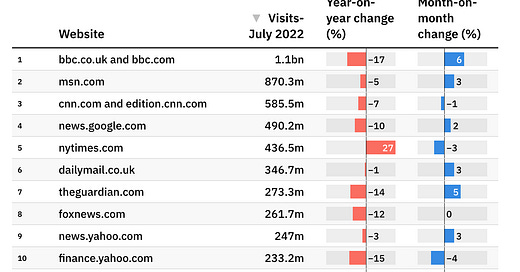Are Brits underselling their news media?
ALSO: I sign up to a Patreon and get irritated by Patreon
I don’t really know anything about the demographics of people who read this newsletter, other than that they’re largely based in either the UK or the US. But people in any territory will probably understand the impulse that led to the creation of GB News, here in London. GB News is, by its own admission, an attempt to bring to Britain the discourse that Fox creates for Americans. That may sound to you like a noble ambition or it may sound like lunacy. We’re a broad church here; I’m not judging.
Either way, I was skeptical about GB News for a number of reasons, not least because the idea of launching a free-to-air TV station in 2021 seem to run contraflow to all media trends. Which isn’t to say that I don’t think linear TV has a future – I do – but that GB News didn’t seem to have any particular strategy for energising more ‘trad’ consumption habits. Instead, I suspected that the impulse to create the new channel was born out of a lack of imagination by executives who had come of age in an era where TV stations, both free-to-air and cable, were the greatest of all media cash cows.
Fast-forward a year and GB News is now competing with TalkTV (a Murdoch-owned spin-off of the TalkRadio brand) for the handful of viewers interested in watching right-wing talk programming. While my initial skepticism about the project hasn’t gone away, I do feel like GB News, particularly, is becoming part of the journalistic furniture here in the UK. It is no longer noteworthy when they get a scoop or a big interview, or when a clip from one of their shows starts going viral on Twitter. They are just another right-wing news outlet, as far as I’m concerned.
That’s the question of their status addressed. The more pressing question is one of funding. It was announced last week that Warner Bros Discovery, a launch partner on the project, was exiting GB News, selling its stake to co-founders Legatum Ventures Ltd and Sir Paul Marshall. Discovery owns a portfolio of media properties including CNN Worldwide as well as local tiles in countries from Poland to New Zealand, and their presence on early GB News press releases certainly leant the project an air of credibility. But while this development was undoubtedly a blow, the channel also announced £60m of new investment as part of that ownership shake-up (Discovery’s initial contribution was thought to be circa £20m).
So there’s money in the banana stand, though no clear way to spend it. GB News has basically acquired all the talent that it’s likely to get – short of a post-premiership Boris Johnson late night talk show. It has 530,000 subscribers on YouTube (842 are currently watching live on that platform) and 262,600 followers on TikTok. It is not clear, for me, where they can go. Double-down on their investment in linear TV which has given it a four-week audience reach of around 2.2m compared with 10.8m (Sky) and 15.8m (BBC)? Push further into its digital and social media strategy? To what end? Why?
News is a funny old business. Press Gazette has just released their rankings for global English-language news brands, and it makes for intriguing reading. At the top of the table (for visits in July 2022) is the BBC, at 1.1bn (the only brand to crack the billion threshold). Behind the Beeb, in the top five, are MSN, CNN, Google and the New York Times. Rounding out the Top Ten (I feel like I’m in archive footage of Top of the Pops featuring some, probably now disgraced, 80s television presenter) are the Daily Mail, the Guardian, Fox, and two Yahoos (News and Finance; I’m not sure why they’re separate). That means that British news publications account for 3 of the top 10 news sources. Only a handful of Indian sites, an Australia broadcaster and a Russian propagandist publication make the Top 25; the rest are British and American.
British news exports well. It’s one of the few things where we, as a nation, have international credibility (along with big-toothed actors and thick-rimmed pies). The dominance of the BBC speaks to the thirst, generally, for a raw, unprocessed news source (this is also, I suspect, why MSN and Google are so high; CNN is, I suppose, considered quite liberal, but not wildly partisan). The Daily Mail has always maintained a triumphant digital presence, offering paparazzi pics, salacious scoops and dizzyingly effective SEO (search engine optimisation) to offset the limitations of their publication. And The Guardian, which has struggled in print but thrived online, continues to over-perform as a publication that really, really ought to have a paywall. But doesn’t.
While American media is involved in a partisan bunfight of its own creation, British news has been quietly stable. This is perhaps what Warner Bros Discovery were thinking, when they made that original investment in GB News. British media and entertainment products are, after all, a pretty safe bet, like French wine or Belgian chocolate.
Keep reading with a 7-day free trial
Subscribe to Future Proof to keep reading this post and get 7 days of free access to the full post archives.




